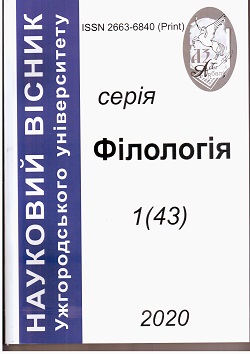PHRASEOLOGICAL MEANING-MAKING AND ITS INTERPRETATION IN THE PERSPECTIVE OF COGNITIVE PARADIGM AND AUTOPOESIS
DOI:
https://doi.org/10.24144/2663-6840.2020.1.(43).106-110Ключові слова:
phraseological units, cognition, language, languaging, meaning-making, autopoiesis, signals, environment, interpretation.Анотація
The article tackles the issue of solving the problem of phraseological meaning – making and its interpretation by means of harmonizing its methodological foundations with the methodological settings of cognitive-communicative paradigm.
The aim of research is to describe phraseological meaning from the standpoint of the biology of cognition, which postulates a close connection of linguistic phenomena, phraselogy among them, with the bodily experience of an individual as an Observer and a living system. The language is treated in the article not as a means of communication, implemented through a sign system, but as a biologically grounded, socially conditioned, cognitively and culturally determined joint activity of human beings. An individual is viewed as a biological organism, that acquires a priori forms of cognition in the process of evolution, these forms allowing him\her to adapt to the environment by interpreting it adequately. An individual starts the process of meaning-making by remembering how actual interaction was constrained by previous events, what kind of emergent affor- dances he observed in the environment, and his inter-inner-bodily dynamics.
Insisting on the significance of subjective experience for construal meaning, the authors determine phraseological meaning not as ready-made knowledge enclosed in recognizable sign forms and identified by an individual in the process of com- munication, but as a semantic potential in memory. Not the ready-made meanings of words, but this potential, acquired by an individual through his\her personal experience, is used by him\her to interpret phraseological units adequately. As the research shows, cognitive methods create promising opportunities not only for describing the mechanisms of phraseological meanings, but also for solving fundamental problems of language, cognition, experience and communication.

